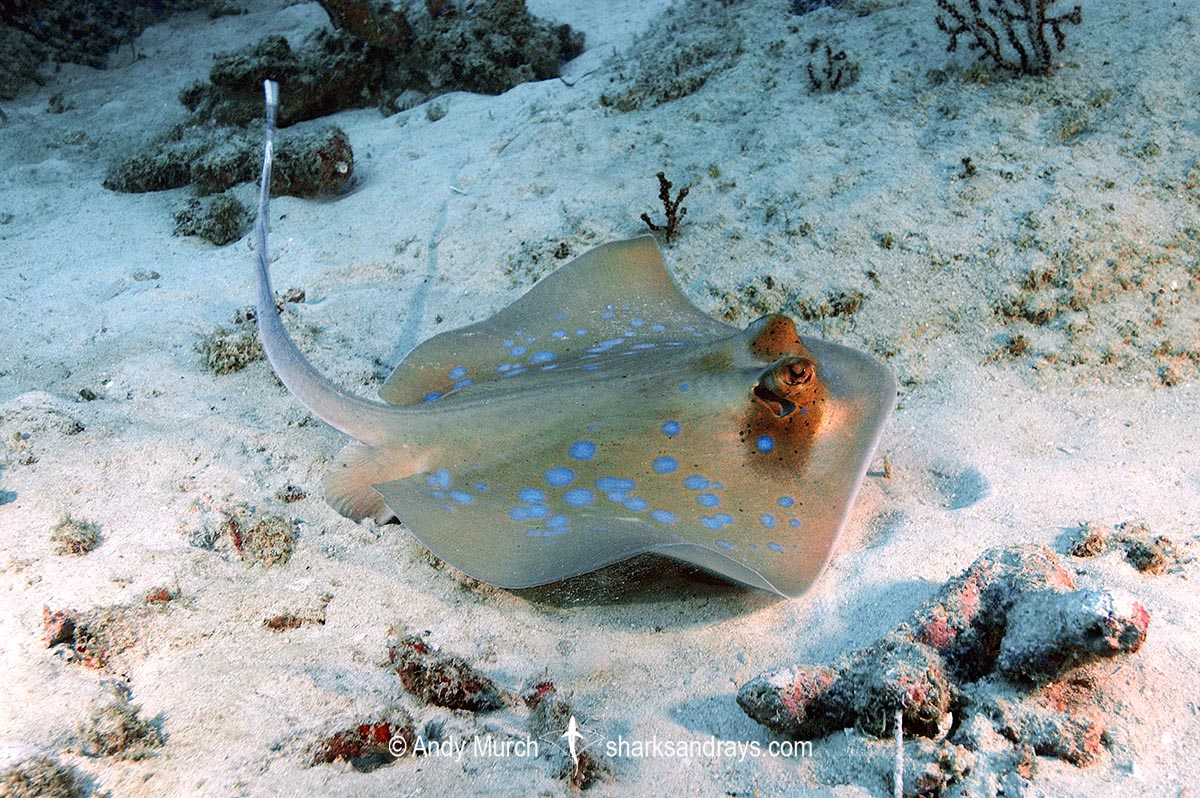Common names
Malacca Strait Bluespotted Maskray, Bluespotted Maskray.
Binomial
Neotrygon malaccensis.
Synonyms
Neotrygon kuhlii, Dasyatis kuhlii.
Identification
Like many other blue spotted neotrygonid rays, the Malacca Strait Bluespotted Maskray was elevated to species status solely on the basis of DNA analysis (Borsa 2017). Collectively, bluespotted neotrygonids share certain traits such as: Relatively small size compared to other stingrays. Kite-shaped disc that is slightly wider than long. Short, bluntly angular snout, without an extended tip. Weakly convex anterior margins of disc. Angular pectoral fin apices. Large pelvic fins with narrowly rounded apices. Large protruding eyes. Small mouth with prominent labial furrows and folds. Narrow, skirt-shaped nasal curtain with an undulate and heavily fringed posterior margin.
Broad tail, depressed at base, tapering gently to caudal sting, then thin but firm to tip. No prickly denticles on tail. Tail length (when intact) about 1.5 x disc width. Long, low ventral finfold. Short dorsal finfold. 1-2 tail stings usually present.
Colour
Dorsum pale greenish-brown with a distinct brown band across eyes, and numerous eye-sized blue spots (often with pale centres), and scattered very small dark brown spots. Blue spots mostly absent on medial strip and towards disc margin. Dark reddish brown mask across eyes does not extend backwards to nape. Posterior margin of mask notched centrally. Ventrum mostly white.
Tail pale blue anteriorly. Tail beyond ventral finfold irregularly banded with white, black, dusky, and pale blue sections. Ventral finfold margin black or dusky.
Size
Maximum disc width unknown.

Conservation Status
The Malacca Strait bluespotted maskray is part of a recently split complex of rays that were previously grouped as Dasyatis kuhlii (Borsa 2017). This member of the Kuhlii complex has not yet been assessed by the IUCN.

Habitat
Tropical seas. On sandy substrates, often adjacent to reefs. From shallow bays to at least 20m. Max depth unknown.
Distribution
Northern region of the Malacca Strait and eastern Andaman Sea. Range based on DNA analysis by Borsa 2017.
Reproduction
Matrotrophic aplacental viviparity. Litter size unknown.
Diet
Diet unknown.
Behavior
Sedentary. Behavior poorly known.
Reaction to divers
Shy and difficult to approach unless extremely accustomed to divers.
Diving logistics
Although not as common as it once was, the Malacca Strait Bluespotted Maskray can be found fairly easily on sandy substrates adjacent to reefs in the Similan Islands in southwest Thailand.

